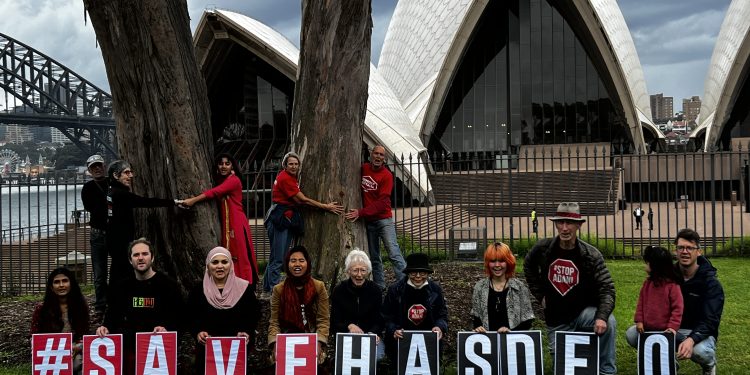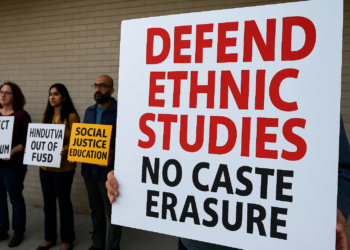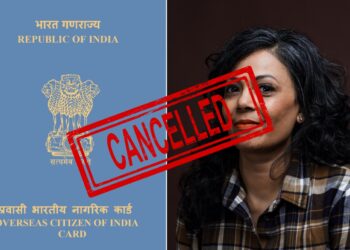A group of activists and nature lovers expressed solidarity with the indigenous Adivasi community of the Hasdeo Arand forest in India by holding a protest outside the Opera House in Sydney on Wednesday. Similar protest were carried out in Washington DC, London and many other places across the world. They carried placards that called for saving the Hasdeo forest in Chhattisgarh, India, from indiscriminate mining and deforestation.
The Stop Adani movement, Survival International and Sapna South Asian Climate Solidarity activists got together in Sydney to highlight the predicament of tribal communities in the Hasdeo Forest area, who are about to lose their centuries-old dwellings with their freedom and livelihood to mining giant Adani Enterprises.
Stop Adani Movement is one of the biggest people-powered campaigns in Australia, boasting of a grassroots network of over 70 local groups taking action in their communities. It was initially formed to prevent Indian businessman and Asia’s richest person Gautam Adani from building Australia’s largest coal mine, the Carmichael project. Consequently, the movement has spread to many other countries around the world, galvanising support for environmental causes.
South Asian Climate Justice campaigner Manjot Kaur, one of the participants at the protest meeting, spoke to NRI Affairs: “Right now, the Stop Adani Movement in Australia is standing in solidarity on a Global Day of Solidarity and Action with the Adivasi community in the Hasdeo Forest who have been resisting Adani’s greedy mining and the government’s illegal giving away of their land and the destruction of their livelihoods that these coal mines would bring,” she said.

“So, right now across the world, groups are gathering to take solidarity photos and to help highlight the human justice crimes that Adani is committing. There’s going to be action today in London, Washington DC, and Australia there’s all of us here in Sydney and also a community of people in Brisbane as well who are going to say ‘Save Hasdeo’. We have a vital and urgent opportunity right now – the Supreme Court of India has a chance to listen to the Adivasis, and the Adivasis have a chance for their message to be heard.”
“We are going to amplify their decades-long resistance and courage so that the Hasdeo Forest and their human rights can be protected,” Manjot added.
In Washington DC, environmentalists and activists gathered in front of the Indian Embassy to display their concern for the Hasdeo Forest and support for the tribal communities that depend on it for survival.
Nikhil Mandalaparthy, advocacy director of Hindus for Human Rights, an organisation that supports pluralism, civil rights, and human rights was at the gathering and posted a tweet from the protest site.
“We’re outside the Indian Embassy in DC with Survival International, Hindus for Human Rights and Indian American Muslim Council, participating in a global day of action to tell the Indian government to respect Indigenous (Adivasi) rights and save Hasdeo from a massive new coal mine,” he posted. Nikhil is also a board member of Sadhna, a coalition of Progressive Hindus.

The Hasdeo Arand region in Chhattisgarh’s northern district of Sarguja is one of central India’s largest blocks of forests. It extends over 170,000 hectares, and its forests are home to over 350 species of animals. In addition, over 20,000 tribals depend on the forest for livelihood. According to activists, around 700 people will be displaced and 200,000 trees felled if the Supreme Court doesn’t hold an urgent hearing to prevent this ecological disaster.
These forests are important for the life of the Hasdeo River, Mahanadi’s largest tributary, which is critical for irrigation of 300,000 hectares of land in a state where rice is the dominant crop. In addition, Hasdeo Arand is the source of livelihood for several forest-dwelling tribes, including the Gond tribe, the second-largest Scheduled Tribe in India. The forest provides them food and medicines in the form of grains, seeds, tubers, flowers, fruits and roots. They also weave leaves and grasses to make ropes, mats, baskets and brooms to earn a living.
On April 6, the Chhattisgarh government granted the final approval of forest land for coal mining to the Parsa Opencast Coal Mining project. Parsa East and Kanta Basan (PEKB), operated by Adani Enterprises through its subsidiary Rajasthan Collieries has received approval to clear more than 841 hectares of forests next to the coal mine. According to sources, the new mine has a reserve of 200 tonnes of coal with a lifespan of 42 years.
Residents of the area have been opposed to mining since it began a decade ago, and in October 2021, villagers living near the mines had walked 300 km to Raipur, the state capital, to oppose mining in the forests. Online petitions have also been lodged to request the Government of India to withdraw its permission to allow mining in this lush forested green cover in central India.











